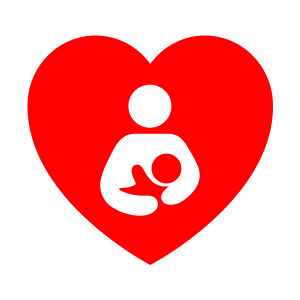 The number of moms choosing to breastfeed has risen roughly 12% since 2000. About 80% to 85% of babies breastfed for a portion of time, with about 35% breastfed for more than a year. The American Academy of Pediatrics (AAP) and the American College of Obstetricians and Gynecologists both strongly recommend breastfeeding.
The number of moms choosing to breastfeed has risen roughly 12% since 2000. About 80% to 85% of babies breastfed for a portion of time, with about 35% breastfed for more than a year. The American Academy of Pediatrics (AAP) and the American College of Obstetricians and Gynecologists both strongly recommend breastfeeding.
Benefits to the baby include infant nutrition, gastrointestinal function, and a better well-being. Additionally, breastfed infants have reduced risk of infectious disease, sudden infant death syndrome, otitis media, and respiratory infections, as compared to formula-fed babies. Breastmilk contains the ideal mix of nutrition for your baby blending nutrients, fat and protein. In addition, a woman’s body will adapt to a growing baby and will adjust the correct proportions of ingredients. Breastfeeding can also reduce the risk of childhood obesity.
While the benefits to the baby are well-known and frequently discussed in society, the benefits to the mothers are usually less widespread. However, breastfeeding can be particularly good for moms as well. Breastfeeding has been linked to lowering a woman’s risk of many diseases, including type 2 diabetes, hypertension, myocardial infraction, coronary artery disease, and certain types of cancer.
Women who breastfed for 12 months or more had a 15% decreased risk of type 2 diabetes and 12% reduced risk of hypertension. Myocardial infraction and coronary heart disease risk can be reduced by 23% for women who breastfed for two or more years. Additionally breastfeeding can reduce the risk of breast, ovarian, and endometrial cancers by 20% to 37%. Studies have shown risks of cancer reduced by 10% to 15% for every 12 months of breastfeeding.
In addition to lowering the risk of disease and cancer, breastfeeding can decrease postpartum bleeding and increase the uterine involution. While a healthy diet with plenty of water, fruits, vegetables, lean protein, and whole grains is recommended, breastfeeding can also help women lose baby weight.
Exclusive breastfeeding is recommended during the first six months of life, with the introduction of complementary foods during months six to 12. Keep in mind, birth practices can help promote successful breastfeeding. Experts recommend that skin-to-skin mother and baby contact should be initiated at birth and women should begin breastfeeding within an hour of birth. Newborns should not be given outside food or drink unless medically indicated. Women that breastfeed should be encouraged to avoid using pacifiers or artificial nipples.
Sources:
https://www.mdedge.com/obgyn/article/190488/obstetrics/maternal-health-benefits-breastfeeding/page/0/1?channel=262
https://www.aap.org/en-us/advocacy-and-policy/aap-health-initiatives/Breastfeeding/Pages/Benefits-of-Breastfeeding.aspx
Benefits of Breastfeeding
More
 If you’re about to be a first time mom, you have many decisions to make, from nursery color schemes, to who you want with you in the delivery room, to the all important baby name. As you prepare for your baby to arrive, take some time to educate yourself on the benefits of breastfeeding. August is breastfeeding awareness month, which means now is the perfect time to learn how this parenting choice can benefit both you and your infant.
If you’re about to be a first time mom, you have many decisions to make, from nursery color schemes, to who you want with you in the delivery room, to the all important baby name. As you prepare for your baby to arrive, take some time to educate yourself on the benefits of breastfeeding. August is breastfeeding awareness month, which means now is the perfect time to learn how this parenting choice can benefit both you and your infant.
Benefits for Baby
- Optimal nutrition – Research shows that breast milk offers the highest quality nutritional benefits for your infant. Your breast milk will naturally contain all of the vitamins and nutrients your baby needs in the first six months of development.
- Immune-boosting benefits – Breast milk naturally contains important disease-fighting substances that will help to build your baby’s immune system. Studies have shown that your baby will be at a reduced risk of stomach viruses, lower respiratory illnesses, ear infections, and meningitis if breastfed at least during the first six months. This protection comes from a substance called secretory immunoglobulin A (IgA), which is present in the first milk your body produces for your baby.
- Reduced risk of allergies – Infants who are breastfed are at a reduced risk of developing allergies. In particular, babies who are fed a formula based on cow’s milk or soy tend to have more allergic reactions than those who are breastfed.
- Long-term protection – Studies show that breastfeeding may reduce your child’s risk of developing certain diseases later in life, including type 1 and type 2 diabetes, high cholesterol, inflammatory bowel disease, Crohn’s disease, and ulcerative colitis.
- Like mother, like child – A woman’s breast milk is specifically tailored to meet the needs of her child. Our bodies produce IgA in response to specific pathogens that we are exposed to throughout our lives, and those lgAs will be passed on to your baby during breastfeeding, offering optimal protection from those pathogens to which you have been exposed.
- Better brain food – A study of more than 17,000 infants found that children who had been breastfed showed enhanced cognitive development, as determined by their IQ scores and other intelligence tests, over those who were fed formula.
- Reduced risk of obesity – Breastfeeding may help your baby to develop healthy eating habits from infancy that will protect him/her from developing an unhealthy weight later in life. Breastfed babies learn to eat until their hunger is satisfied, and tend to carry this healthy habit into adolescence. In addition, compared to formula, breast milk contains less insulin, which stimulates the creation of fat.
Benefits for Mom
- Mental health – Breastfeeding can reduce a new mother’s stress level and her risk of postpartum depression. The National Institutes of Health reviewed more than 9,000 study abstracts and concluded that women who did not breastfeed or who stopped breastfeeding early were at a higher risk of postpartum depression. Breastfeeding also releases the hormone oxytocin, which stimulates feelings of relaxation.
- Emotional bonding – The emotional bonding between mom and baby that occurs during breastfeeding is an important part of both the baby’s emotional development, and your connection with one another.
- Long-term protection – Numerous studies have found that the longer a woman breastfeeds, the lower her risk for developing breast and ovarian cancer.
- Assists in weight loss – While you’re pregnant, your body automatically layers on extra fatty tissue so you’ll have enough fat stores to begin and support breastfeeding. It’s true that breastfeeding can help you lose your pregnancy weight naturally without compromising either your health or your baby’s (considering you are eating healthy). Your body will burn calories to make breast milk.
If you have questions about breastfeeding, or if you are still deciding if it is the right choice for you and your baby, contact your OBGYN today to discuss your options. The doctors at Chouchani, Sayegh and Bagnarello MD are dedicated to helping you and your baby achieve optimal health.
More
 The number of moms choosing to breastfeed has risen roughly 12% since 2000. About 80% to 85% of babies breastfed for a portion of time, with about 35% breastfed for more than a year. The American Academy of Pediatrics (AAP) and the American College of Obstetricians and Gynecologists both strongly recommend breastfeeding.
The number of moms choosing to breastfeed has risen roughly 12% since 2000. About 80% to 85% of babies breastfed for a portion of time, with about 35% breastfed for more than a year. The American Academy of Pediatrics (AAP) and the American College of Obstetricians and Gynecologists both strongly recommend breastfeeding.
